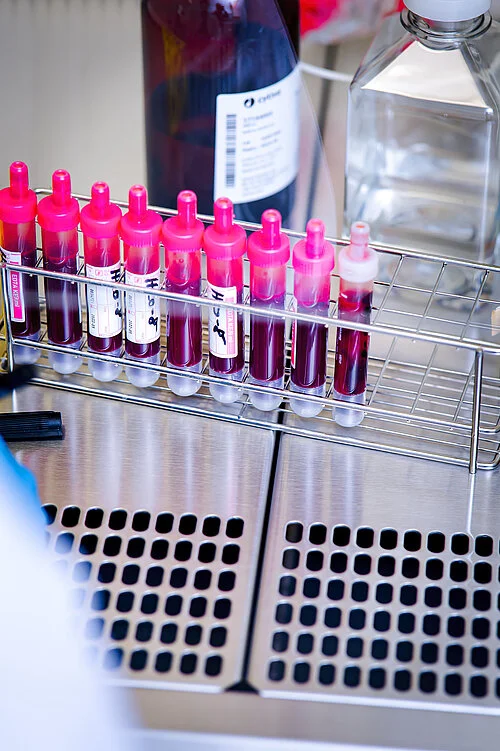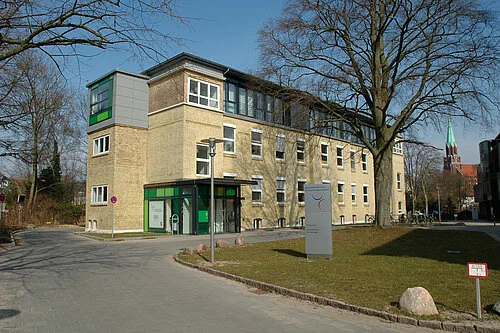Possible new biomarker for better detection of numerous inflammatory diseases
Increased consumption of tryptophan can indicate minimal residual inflammation in a variety of chronic inflammatory diseases.
Tryptophan is an essential amino acid, which means that it cannot be produced by the body but must be included as part of our diet. People with chronic bowel inflammation consume significantly more tryptophan than healthy people. Previous research has already shown this, also involving members of the Cluster of Excellence "Precision Medicine in Chronic Inflammation" (PMI). Other studies have also found this to be the case in certain individual inflammatory diseases. PMI cluster members have now been able to show in a systematic analysis that this tryptophan consumption is present as a consequence of inflammation in a large number of chronic inflammatory diseases. The researchers recently published their findings in the journal eBioMedicine.
Tryptophan reduced in most chronic inflammatory diseases
Over the past ten years, the Cluster of Excellence PMI team in Kiel has used mass spectrometry to examine blood samples from patients treated for chronic inflammatory diseases at the Comprehensive Center for Inflammation Medicine (CCIM) at the University Hospital Schleswig-Holstein (UKSH), Campus Kiel. The tryptophan content and, in selected patient groups, the content of various degradation products of tryptophan were examined. "We have integrated this analysis as a new biomarker into everyday clinical practice and determined the tryptophan levels in a standardized laboratory profile," explained the first author of the paper, Dr. Danielle Harris from the Institute of Clinical Molecular Biology (IKMB) at the Faculty of Medicine of Kiel University (CAU) and the UKSH, Campus Kiel. As a result, data was collected from almost 2,000 patients at various points in time over a period of ten years. As the patients came to the outpatient clinic several times, a total of around 30,000 samples were taken. This included data on 13 chronic inflammatory diseases, in 9 of which the tryptophan concentrations in the blood were significantly reduced. In addition to Crohn's disease and ulcerative colitis, these also include numerous rheumatic diseases (e.g. rheumatoid arthritis, axial spondylarthritis, systemic lupus erythematosus).
The Comprehensive Center for Inflammation Medicine comprises a large interdisciplinary outpatient clinic for chronic inflammatory diseases at both UKSH sites, Kiel and Lübeck, which were originally founded on the initiative of the Cluster of Excellence "Inflammation at Interfaces", the predecessor of the PMI Cluster. Thanks to the close cooperation of various specialists, they enable the best possible interdisciplinary care for patients with serious chronic inflammatory diseases. "Our work demonstrates the strength of the CCIM for research as well: we were able to systematically investigate tryptophan as a new biomarker over a longer period of time using a large number of patients with chronic inflammatory diseases," emphasized the lead author Konrad Aden, Else Kröner Clinician Scientist Professor at the CAU’s Faculty of Medicine, working group leader at the IKMB, CAU and UKSH, and senior physician at the Department of Internal Medicine I at the UKSH, Campus Kiel. "So far, individual, smaller studies have shown a tryptophan deficiency for individual chronic inflammatory diseases, but we have now been able to prove this very systematically for a number of different diseases and thus demonstrate the clinical relevance of tryptophan as a potential biomarker for chronic inflammation," Aden continued.
Marker for minuscule residual inflammation
In addition, the team made another observation: the tryptophan concentrations in the blood were also reduced in people in whom no inflammation could be detected with the previous clinical examinations. In addition to visible signs of inflammation, doctors have so far mainly used an established laboratory diagnostic biomarker, the C-reactive protein (known as the CRP value), to detect inflammation in the body. "With the reduced tryptophan level, we now have a new, potential marker that can detect even the smallest residual inflammation," explained Aden. "This can be helpful, for example, in deciding when and to what intensity drug therapy should be started," explained Aden.
"An important goal of our Cluster of Excellence is to identify disease phenomena that apply across the board to the various inflammatory diseases, regardless of the organs that they predominantly affect. The present study has succeeded in doing this with tryptophan as a possible biomarker," said Professor Stefan Schreiber, spokesperson for the Cluster of Excellence PMI. "If this marker continues to hold its own in clinical trials, it could supplement the existing standard values and significantly improve diagnostics," Schreiber continued.
Since members of the Cluster of Excellence and other researchers first demonstrated a tryptophan deficiency in chronic bowel inflammation in 2017 (publication in the journal Gastroenterology), they have been researching the importance of tryptophan metabolism for inflammation. The current studies also focus on the influence of the individual gut microbiome and its influence on tryptophan as a biomarker. Co-author Silvio Waschina, Junior Professor of Nutriinformatics at the CAU, emphasized: “The connection with the microbiome is particularly fascinating, as we know that microbial degradation products of the tryptophan metabolism have an intensive interaction with the human immune system.” One approach here is to compensate for the deficiency by administering additional metabolic products of tryptophan and thus reduce the inflammation. Cluster members are currently also conducting clinical studies, for example. This research area is also to be continued in a possible further funding phase, for which the Cluster of Excellence PMI is currently preparing a follow-up application.
Tryptophan concentrations in the blood were significantly reduced in 9 of 13 chronic inflammatory diseases examined.
Original publications:
Danielle M. M. Harris et al. Tryptophan degradation as a systems phenomenon in inflammation – an analysis across 13 chronic inflammatory diseases. eBioMedicine (2024). https://doi.org/10.1016/j.ebiom.2024.105056
Also mentioned publication from 2017:
Susanna Nikolaus et al. Increased Tryptophan Metabolism Is Associated With Activity of Inflammatory Bowel Diseases. Gastroenterology (2017). https://doi.org/10.1053/j.gastro.2017.08.028
About the Cluster of Excellence PMI
The Cluster of Excellence "Precision Medicine in Chronic Inflammation" (PMI) is being funded from 2019 to 2025 through the German Excellence Strategy (ExStra). It succeeds the "Inflammation at Interfaces” Cluster, which was already funded in two periods of the Excellence Initiative (2007-2018). Around 300 members from eight institutions at four locations are involved: Kiel (Kiel University, University Medical Center Schleswig-Holstein (UKSH), Muthesius University of Fine Arts and Design, Kiel Institute for the World Economy (IfW), Leibniz Institute for Science and Mathematics Education (IPN)), Lübeck (University of Lübeck, University Medical Center Schleswig-Holstein (UKSH)), Plön (Max Planck Institute for Evolutionary Biology) and Borstel (Research Center Borstel - Leibniz Lung Center).
The goal is to translate interdisciplinary research findings on chronic inflammatory diseases of barrier organs to healthcare more intensively, as well as to fulfil previously unsatisfied needs of the patients. Three points are important in the context of successful treatment, and are therefore at the heart of PMI research: the early detection of chronic inflammatory diseases, the prediction of disease progression and complications, and the prediction of individual responses to treatment.
Press office
fbuhse@uv.uni-kiel.de+49 (0)431/880 4682 https://precisionmedicine.de
Cluster of Excellence "Precision Medicine in Chronic Inflammation"
Scientific Office
Head: Dr. habil. Susanne Holstein Postal
Christian-Albrechts-Platz 4, 24118 Kiel, Germany
Contact: Sonja Petermann
+49 (0)431 880-4850, fax: +49 (0)431 880-4894
spetermann@uv.uni-kiel.de
Twitter: PMI @medinflame





